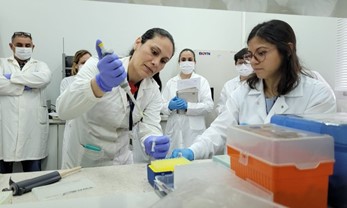Tackling Food Safety in Paraguay
IESC and Partner Kansas State University Strengthen Paraguay’s Food Laboratories
Each year, “unsafe food causes 600 million cases of foodborne diseases and 420,000 deaths” worldwide, according to the World Health Organization. As Paraguay depends on agricultural goods for more than 72.6 percent of its total exports, quality testing in line with international standards can help identify and control food safety risks. 
In 2020 and 2021, the USDA-funded T-FAST project conducted comprehensive assessments of public and private laboratories in Paraguay, highlighting knowledge gaps. These gaps result in inconsistencies, delays, and limited risk management measures that increase the risk of foodborne illnesses and negatively impact the country’s credibility as an agricultural exporter. The World Trade Organization’s Trade Facilitation Agreement article 5.3, “Testing Procedures,” addresses the need to strengthen Paraguay’s laboratory testing capacity.
T-FAST provides technical assistance to Paraguay through its implementing partner Kansas State University (KSU), a global leader in food safety and lab screening technology. In the fall of 2022, KSU professors conducted practical and theoretical classes for Paraguay’s National Trade Facilitation Committee (NTFC) members. The NTFC supports safe, reliable, and efficient systems in public institutions that facilitate international trade.
In their training sessions, KSU professors covered the use of Polymerase Chain Reaction (PCR) to detect food allergens; Hazard Analysis and Critical Control Point System (HACCP) to prevent and monitor chemical, biological, and physical food safety risks before inspection; and the evaluation and control of antibiotic residues and harmful mold and mycotoxins, which can cause food poisoning and even death.
T-FAST built upon SENAVE’s previously established residue testing program for sesame products, expanding laboratory staff capabilities to identify residues in other produce products. Carolina Garay, head of the plant health laboratory at Paraguay’s National Vegetable and Seed Health Service (SENAVE), is responsible for testing fresh produce and seeds. She explained that the training was essential in further developing plant safety control systems.
KSU’s professors trained 129 technicians from Paraguayan laboratories on food safety testing to increase food quality, reduce delays, and improve trade.
Trade-Facilitating Agricultural Systems and Technology (T-FAST) is a USDA Food for Progress initiative in Paraguay implemented by IESC. The project is simplifying, modernizing, and harmonizing agricultural trade processes in Paraguay. The project motivates and incentivizes collaboration across the Paraguayan government, the private sector, and donors to achieve maximum impact; builds organizational and human capacity of the National Trade Facilitation Committee and institutions involved in regulating and facilitating agricultural trade; and addresses Category C Notifications of the World Trade Organization’s Trade Facilitation Agreement (TFA) while fostering a culture of continuous improvement to enable Paraguay’s overall compliance with TFA standards.

